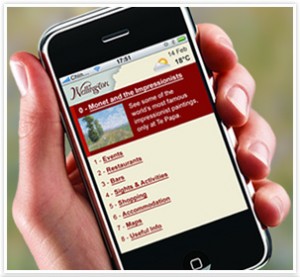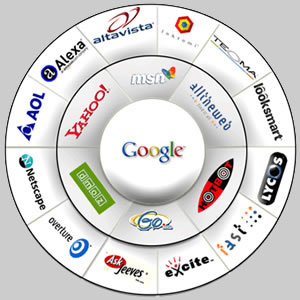August 30th, 2011 → 12:36 am @ iowawebguy // No Comments
One of the most common misconceptions surrounding the web right now is a “mobile web site” and a “mobile-friendly web site.” The difference is much more than a name.
Mobile-Friendly Web Site
 A mobile-friendly web site is a traditional web site that is designed to display correctly on a mobile device. The design and functionality are exactly as they would be on your computer. Of course, there are some differences as mobile devices vary on the use of interactivity such as Flash.
A mobile-friendly web site is a traditional web site that is designed to display correctly on a mobile device. The design and functionality are exactly as they would be on your computer. Of course, there are some differences as mobile devices vary on the use of interactivity such as Flash.
Mobile Web Site
Alternatively, a true mobile web site is designed and optimized to display on a mobile device. Because a mobile device has a smaller screen, only “on-the-go” content is displayed. Fewer and lower quality graphics should be used as mobile web sites should also take bandwidth into consideration to speed up load times.
Mobile Web Site Strategy
There are several strategic decisions that will need to be taken into account:
Example
Here is an example using Panera Bread. They do a really good job optimizing their traditional web site for their mobile web site.
Do you have a mobile site and how does it measure up?
–Iowa Web Guy
Blog &Mobile Development &Questions &web development &Web Strategy
August 23rd, 2011 → 9:00 pm @ iowawebguy // No Comments
Every web site MUST have a “web host” so your site can be found on the Internet.
 What is Web Hosting?
What is Web Hosting?
Basically, web hosting is “leasing” disk space on a web server. This space is where your web site files and folders live for the world to view. The web server may also contain email and database hosting depending on your web hosting plan.
Why do I need a Web Host?
Web hosting companies have the facilities and resources to provide fast, reliable web hosting that many individuals and businesses do not have (expert staff, security, power back-up, multiple internet connections, back-up servers and parts, etc). Leasing web hosting space is very cost-effective with basic web hosting plans starting at pennies a day.
How does Web Hosting work?
Joe, a guy in Des Moines, Iowa, wants to visit a web site: www.google.com.
You could think of it this way:
Jane, a gal in Des Moines, Iowa, wants to send you (an Ames, Iowa resident) a LETTER in the mail.
Without your P.O. Box (or web hosting space) and the post office (or Internet), the letter would not be delivered to your address (or web site).
Geesh!
I hope that wasn’t too confusing. I tried to make a very complicated subject simple…
Check back for a future blog on how to choose a web host.
— Iowa Web Guy
August 15th, 2011 → 11:31 pm @ iowawebguy // No Comments
One of the most asked questions I receive is: “How can I get my website to rank high on Google?”
 This is obviously a very important question, so I’ll cover a couple basics:
This is obviously a very important question, so I’ll cover a couple basics:
Tip #1 – NEVER believe someone that can GUARANTEE a high page rank. While it’s possible, it’s impossible to guarantee. Google’s search algorithm is a secret, but they do give us some basic tips and hints on how the equation works.
Tip #2 – Focus on 5-7 of your best “search phrases” meaning what would your ideal target (the person you want to come to your web site) type into Google to find your site.
Tip #3 – Content is KING. Use the “search phrases” you’ve defined in Tip #2 as many times as possible when writing your website copy. Do NOT just dump them into your website, use them in sentence and paragraph form. Google can actually detect this and actually penalize you!
Tip #4 – Ditch the “Image Text“. I still see several websites that use graphics to display actual copy. I find people that want to do this when they can’t get the page to format correctly, or want to use a special font that isn’t supported on all computers. Google and other search engines CAN’T read the text in an image.
Tip #5 – Add a Sitemap and Robots file. If you don’t have them, you need them. These both instruct the search engines what to do with the pages of your website. Here is a link to a FREE Sitemap Generator.
There are other tips that I will cover in future blog posts. A good web strategy should define these search phrases and implement them successfully into your website.
If you have questions or need help with your search engine strategy, give me a shout!
–Iowa Web Guy
Blog &General &Questions &Search Engines &web development &Web Strategy
August 5th, 2011 → 5:40 am @ iowawebguy // 2 Comments
So, you’ve decided you need a web site. Awesome! It’s the cheapest form of advertising and the best bang for your buck.
 However, to get the best return on your investment (ROI) you should be asking some basic questions in order to develop a PLAN and define GOALS. These questions should be asked BEFORE you begin development.
However, to get the best return on your investment (ROI) you should be asking some basic questions in order to develop a PLAN and define GOALS. These questions should be asked BEFORE you begin development.
1) What is the purpose of your web site?
Are you wanting to:
2) What are your goals and objectives and how do you measure success?
In order to effectively develop a web site, you need to define your goals and objectives early and determine how you will measure success. Then, build your site to accomplish these goals putting metrics (ways to measure) in place in order to evaluate success.
3) Who is your competition and what are they doing?
Do they have a web site? What do you like and dislike about their web site. What can you do to make your site stand out?
4) What should I budget for web site development?
Yep, you knew this one would be here, right? Everything is possible, but you need to set a budget for your site. Depending on the complexity of your site, this will vary by hundreds if not thousands. One of the most common questions I receive is: “How much does it cost to develop a web site?” This question is much like “How much does it cost to build a house?” There are many factors that determine the cost. Look for an upcoming blog post with tools that can help you determine a range of costs. Suprisingly, the answer could be $O.OO (aka FREE).
5) How often will you be updating your site?
This is a very important question. If your site is going to be updated frequently, you’ll want to consider a content management system (CMS) behind the scenes so you can update the site yourself (hopefully easily) to lower your long-term costs. Alternatively, if you don’t plan on updating your site on a regular basis, a CMS system would not be necessary–lowering your up-front costs. (However you’ll have to pay your developer when you want updates.)
These are the basic questions you should ask PRIOR to developing a web site. These questions alone can help you not only streamline the development process, but also save you TIME and MONEY! There are several more questions which I will discuss in upcoming posts.
As always, if you have any questions or comments post below.
— The Iowa Web Guy
August 1st, 2011 → 6:51 pm @ iowawebguy // No Comments
 Welcome to IowaWebGuy.com!
Welcome to IowaWebGuy.com!So, I just had a flashback to my first programming tutorial. I’m pretty sure all developers, no matter your language of choice, completed the “Hello World” tutorial.
Anyway, enough about that and on to the blog! I’ve been consulting on all things web and all things development for several years. I’ve had a lot of help and learned a lot along the way. This blog is my way of giving back!
I’ve been wanting to start this blog for quite some time and I look forward to answering your questions and sharing information you may not even know you need.
Feel free to ask questions in the comments section if they relate to a particular post, or click the “Ask a Question” link on the homepage to ask a new question. I’ll try my best to respond promptly.
— The Iowa Web Guy